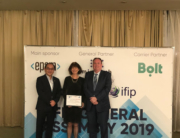TC9’s newly reformed Working Group 9.3 on Intelligent Communities aims to stimulate debate and disseminate research on the complex connections between communities, intelligence and ICTs.
The group seeks to bring together many disciplines and perspectives bearing on the interaction between the community and intelligent technology. Intelligent communities and community informatics are closely related interdisciplinary fields aiming to empower communities and support their social, cultural, and economic development.
In keeping with the focus of TC9, WG9.3 aims to focus on the social implications of these fields, including actual and potential social impacts of these technologies and their applications. Working Group Member Dr Sabih-Ur Rehman, from Australia’s Charles Sturt University, is leading a project amongst members of the group looking at the increasingly common appearance of robotic pets in the community and in the home – from public robotic statues shaped like dragons that eat recycling waste to their use as therapeutic devices in dementia care.
The research team is currently working on a project to explore the role of robotic pets in dementia care. Initial research has suggested that interactions with pet robots has shown improvements in overall well-being for people with dementia. Agitated behaviours are common in people suffering with dementia and can range from excessive restlessness to physical or verbal aggression.
Early research into the use of technological solutions to assist in overcoming these behaviours has suggested robotic pets can act as an effective anti-agitation device for people with dementia, however further studies are required to gather perceptions about the use of robotic pets in such situations, along with their effectiveness and any associated ethical, social or psychological issues. The project aims to examine and investigate these aspects along with the benefits and challenges that may arise for caregivers due to the introduction of such technological solutions.
The transdisciplinary working group includes international researchers working collaboratively. They represent universities from Australia, the Netherlands and England, as listed below:
- Charles Sturt University, Australia: Dr Sabih Rehman (Project Lead), Professor Oliver Burmeister, Dr Jenni Greig, Mr. Adam Poulsen and Dr Anwaar Ulhaq;
- University of Salford, UK: Dr David Krepsp;
- Leiden University, Netherlands: Dr Eduard Fosch-Villaronga; and
- Victoria University, Australia: Associate Professor Shah Miah.
WG 9.3 is grateful to the CSU School of Computing and Mathematics for providing equipment and technology space, and to Leiden University’s eLaw Center for Law and Digital Technologies that also gave its support to enable this research to happen.






